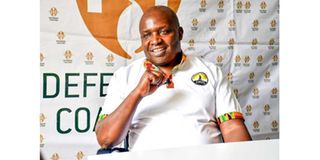Kamau Ngugi: There can't be climate policies without women

National Coalition of Human Rights Defenders in Kenya (Defenders Coalition) Executive Director Kamau Ngugi on February 2, 2022.
What you need to know:
- Land is a major issue of conflict, yet without land tenure, women cannot build resilience against climate shocks. With sensitisation, women have become aware of their role in protecting biodiversity for the benefit of all.
- The number of grassroots women joining climate activism has grown; they are on the frontline of the campaigns for climate justice and lead conservation drives at the local, regional and international levels.
This year’s International Women’s Day (IWD) has the theme ‘Gender Equality Today for a Sustainable Tomorrow’ with a focus on the contribution of women and girls to promoting resilience against the impacts of climate change.
Last year’s UN Climate Change Conference (COP26) showed just how hard it is for women’s voices to make it to the climate resolutions.
Of the 12 members of the COP26 core team, there were just two women. This under-representation led to global protests, with over 400 female climate leaders under She Changes Climate, UN Women and International Women’s Initiative demanding more inclusion of women in the steering committee. Changes were, however, not made.
In Kenya, the struggle continues. Women climate activists strive to save our environment from degradation, results of which lead to emissions of greenhouse gases, warming the atmosphere to dangerous levels. While they do their work they suffer intimidation, threats and attacks. Some have been killed. We speak to Kamau Ngugi, Executive Director, Defenders Coalition.
What are your key highlights from this year’s theme for IWD?
There cannot be climate policies without women at the decision-making table.
What is the status of women climate activists in Kenya?
I work with human rights defenders from communities that are increasingly being challenged with the harsh weather conditions. Resources are diminishing day by day and communities are fighting for the little available.
Land is a major issue of conflict, yet without land tenure, women cannot build resilience against climate shocks. With sensitisation, women have become aware of their role in protecting biodiversity for the benefit of all.
Over the past decade, the number of grassroots women joining climate activism has grown. They are saying ‘No’ to the destruction of Mau Forest or Embombut Forest. They are on the frontline of the campaigns for climate justice and lead conservation drives at the local, regional and international levels.
The most worrying thing is that their risks to attacks multiply the more they become vocal. Recently, we lost Elizabeth Ibrahim, a staunch environmental and land rights defender in Isiolo County.
On July 15, 2021, Joannah Stutchbury, an environmentalist, was murdered for standing up to destruction of Kiambu Forest.
A month later, two women environmental activists from Owino Ohuru slums in Mombasa were intimidated for seeking justice for residents and victims of environmental pollution. These show just how bad the situation is for the women human rights defenders.
How does the Defenders Coalition support such women?
We are the first responders to rescue a woman human rights defender at risk. We continue to push for policies to support the creation of preventive measures.
Activism comes with a full package of danger. You step on the toes of perpetrators of injustices and they always fight back.
We are now encouraging community-centred protection of human rights defenders. This strategy puts communities at the core of shielding the activists from any harm.
How many women human rights defenders are you currently working with?
The figure is fluid. The more we sensitise the communities, the more we have women human rights defenders. We work towards solidifying the work of the women human rights defenders.
We now have regional and national networks of women human rights defenders. For instance, we have Nairobi, Western, Central Nyanza and Wajir regional networks. They liaise with others whenever there is an issue. They also share and learn from each other.
Human rights issues are interconnected. Take the example of a family whose livestock have all died from drought, resorting to marrying off a girl in exchange for money to buy food.
Such a problem calls for the protection of the environment so that our girls do not suffer the consequences of destroying our biodiversity.
Solving the issue requires the solidarity of the climate and environmental activists and girls’ rights advocates to push for gender-responsive climate solutions.
What legal instruments protect human rights defenders’ work?
The UN Declaration on Human Rights Defenders and the Constitution are the key. Although declarations are not binding, member States are obliged to recognise the rights of human rights defenders.
Chapter Four of the Constitution empowers every citizen to safeguard the rights provided. Moreover, the existence of International Women Human Rights Defenders Day, means the UN has recognised the role of women in this space.
On a scale of one to 10, how would you rate the government’s performance in the protection of women human rights defenders?
The government has failed terribly. It sees them as enemies threatening their comfort zones. I would give it one, but we can do better if the two-third-gender rule is enacted.
What is your message for women as we mark this day?
Women cannot sit back and hope things change in their favour. They must stand up and demand their rights.





